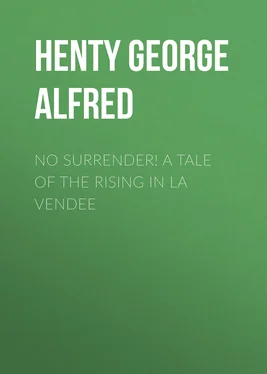George Henty - No Surrender! A Tale of the Rising in La Vendee
Здесь есть возможность читать онлайн «George Henty - No Surrender! A Tale of the Rising in La Vendee» — ознакомительный отрывок электронной книги совершенно бесплатно, а после прочтения отрывка купить полную версию. В некоторых случаях можно слушать аудио, скачать через торрент в формате fb2 и присутствует краткое содержание. Жанр: foreign_children, foreign_antique, foreign_prose, prose_military, на английском языке. Описание произведения, (предисловие) а так же отзывы посетителей доступны на портале библиотеки ЛибКат.
- Название:No Surrender! A Tale of the Rising in La Vendee
- Автор:
- Жанр:
- Год:неизвестен
- ISBN:нет данных
- Рейтинг книги:4 / 5. Голосов: 1
-
Избранное:Добавить в избранное
- Отзывы:
-
Ваша оценка:
- 80
- 1
- 2
- 3
- 4
- 5
No Surrender! A Tale of the Rising in La Vendee: краткое содержание, описание и аннотация
Предлагаем к чтению аннотацию, описание, краткое содержание или предисловие (зависит от того, что написал сам автор книги «No Surrender! A Tale of the Rising in La Vendee»). Если вы не нашли необходимую информацию о книге — напишите в комментариях, мы постараемся отыскать её.
No Surrender! A Tale of the Rising in La Vendee — читать онлайн ознакомительный отрывок
Ниже представлен текст книги, разбитый по страницам. Система сохранения места последней прочитанной страницы, позволяет с удобством читать онлайн бесплатно книгу «No Surrender! A Tale of the Rising in La Vendee», без необходимости каждый раз заново искать на чём Вы остановились. Поставьте закладку, и сможете в любой момент перейти на страницу, на которой закончили чтение.
Интервал:
Закладка:
G. A. Henty
No Surrender! A Tale of the Rising in La Vendee
Preface
In the world's history, there is no more striking example of heroic bravery and firmness than that afforded by the people of the province of Poitou, and more especially of that portion of it known as La Vendee, in the defence of their religion and their rights as free men. At the commencement of the struggle they were almost unarmed, and the subsequent battles were fought by the aid of muskets and cannon wrested from the enemy. With the exception of its forests, La Vendee offered no natural advantages for defence. It had no mountains, such as those which enabled the Swiss to maintain their independence; no rivers which would bar the advance of an enemy; and although the woods and thickets of the Bocage, as it was called, favoured the action of the irregular troops, these do not seem to have been utilized as they might have been, the principal engagements of the war being fought on open ground. For eighteen months the peasants of La Vendee, in spite of the fact that they had no idea of submitting either to drill or discipline, repulsed the efforts of forces commanded by the best generals France could furnish; and which grew, after every defeat, until at length armies numbering, in all, over two hundred thousand men were collected to crush La Vendee.
The losses on both sides were enormous. La Vendee was almost depopulated; and the Republicans paid dearly, indeed, for their triumph, no fewer than one hundred thousand men having fallen, on their side. La Vendee was crushed, but never surrendered. Had the British government been properly informed, by its agents, of the desperate nature of the struggle that was going on; they might, by throwing twenty thousand troops, with supplies of stores and money into La Vendee, have changed the whole course of events; have crushed the Republic, given France a monarch, and thus spared Europe over twenty years of devastating warfare, the expenditure of enormous sums of money, and the loss of millions of lives.
G. A. HentyChapter 1: A French Lugger
Some half a mile back from the sea, near the point where the low line of sandy hill is broken by the entrance into Poole Harbour, stood, in 1791, Netherstock; which, with a small estate around, was the property of Squire Stansfield. The view was an extensive one, when the weather was clear. Away to the left lay the pine forests of Bournemouth and Christ Church and, still farther seaward, the cliffs of the Isle of Wight, from Totland Bay as far as Saint Catherine Point. Close at hand to the south was Studland Bay, bounded by Handfast Point. Looking towards the right was a great sheet of shallow water, for the most part dry at low tide, known as Poole and Wareham Harbours, with its numerous creeks and bays.
Netherstock was an old house, with many nooks and corners. The squire was a justice of the peace but, unless there was some special business on, he seldom took his place on the bench. He was a jovial man, who took life easily. He was popular among his neighbours, especially among the poorer classes; for whom he had always a pleasant word, as he rode along; and who, in case of illness, knew that they could always be sure of a supply of soup, or a gill of brandy at Netherstock.
Among those of his own class it was often a matter of wonder how James Stansfield made both ends meet. The family had, for two or three generations, been of a similar temperament to that of the present holder; men who spent their money freely, and were sure to be present whenever there was a horse race, or a main of cocks to be fought, or a prizefight to come off, within a day's ride of Netherstock. Gradually, farm after farm had been parted with; and the estate now was smaller, by half, than it had been at the beginning of the century.
James Stansfield had, however, done nothing further to diminish it. He had a large family, but they could hardly be said to be an expensive one, seeing that little was spent upon the fashion of their clothes; and beyond the fact that the curate in charge of the little church in the village of Netherstock came over, every morning for two or three hours, to give the boys and girls the elements of education, they went very much their own way. Mrs. Stansfield had died, five years before this. Polly, the eldest girl, aged twenty, acted as mistress of the house. Next to her, at intervals of little more than a year, came Ralph and John; two strongly built young fellows, both fearless riders and good at all rustic games. What supervision the farm work got was given by them.
Patsey, the second girl, was generally admitted to be the flower of the Stansfields. She was bright, pretty, and good tempered. She was in charge of the dairy, and the Netherstock butter was famous through the country round, and always fetched top prices at the market. The youngest of the family was Leigh, who was now fourteen. He was less heavily built than his brothers, but their tutor declared that he was the quickest and most intelligent of his pupils; and that, if he had but a chance, he would turn out a fine young fellow.
The boys were all fond of boating and sailing, which was natural enough, as the sea washed two sides of the estate. They had two boats. One of these lay hauled up on the sands, a mile to the east of the entrance to the harbour. She was a good sea boat and, when work was slack about the place, which indeed was the normal state of things, they would often sail to Weymouth to the west, or eastward to Yarmouth or Lymington, sometimes even to Portsmouth. The other boat, which was also large, but of very shallow draught of water, lay inside the entrance to the harbour; and in her they could go either north or south of Brownsea Island, and shoot or fish in the many inlets and bays. There were few who knew every foot of the great sheet of water as they did, and they could tell the precise time of the tide at which the channels were deep enough for boats drawing from two to three feet of water.
The most frequent visitor to Netherstock was Lieutenant, or, as he was called in courtesy, Captain Whittier, the officer in command of the coast guard station between Poole and Christ Church; his principal station being opposite Brownsea Island, the narrowest point of the entrance to the harbour. He was a somewhat fussy little officer, with a great idea of the importance of his duties, mingled with a regret that these duties did not afford him full scope for proving his ability.
"Smuggling has almost ceased to exist, along here," he would say. "I do not say that, across the harbour, something that way may not still be done; for the facilities there are very much greater than they are on this side. Still, my colleague there can have but little trouble; for I keep a sharp lookout that no boat enters by the passage south of the island without being searched. Of course, one hears all sorts of absurd reports about cargoes being run; but we know better, and I believe they are only set on foot to put our officers from Swanage Westward, and beyond Christ Church down to Hurst Castle, off their guard."
"No doubt, captain; no doubt," James Stansfield would agree. "Still, I fancy that, although times are not what they were, it is still possible to buy a keg of brandy, occasionally, or a few yards of silk or lace, that have never paid duty."
"Yes, no doubt occasionally some small craft manages to run a few kegs or bales; and unfortunately the gentry, instead of aiding his majesty's representatives, keep the thing alive by purchasing spirits, and so on, from those who have been concerned in their landing."
"Well, you know, Captain Whittier, human nature is pretty strong. If a pedlar comes along here with ribbons and fal-lals, and offers them to the girls at half the price at which they could buy them down at Poole, you can hardly expect them to take lofty ground, and charge the man with having smuggled them."
Читать дальшеИнтервал:
Закладка:
Похожие книги на «No Surrender! A Tale of the Rising in La Vendee»
Представляем Вашему вниманию похожие книги на «No Surrender! A Tale of the Rising in La Vendee» списком для выбора. Мы отобрали схожую по названию и смыслу литературу в надежде предоставить читателям больше вариантов отыскать новые, интересные, ещё непрочитанные произведения.
Обсуждение, отзывы о книге «No Surrender! A Tale of the Rising in La Vendee» и просто собственные мнения читателей. Оставьте ваши комментарии, напишите, что Вы думаете о произведении, его смысле или главных героях. Укажите что конкретно понравилось, а что нет, и почему Вы так считаете.












